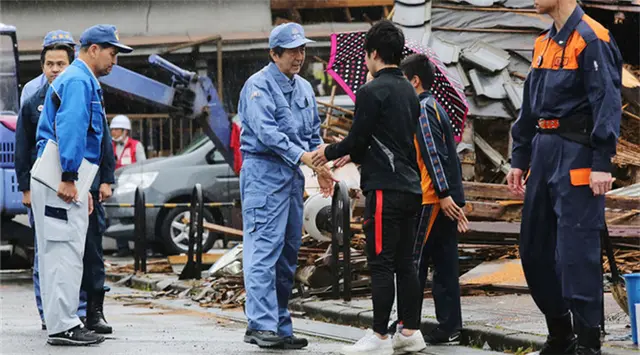Prime Minister Shinzo Abe is so focused on dealing with the earthquake disaster in Kyushu that he has dropped the politically strategic idea of holding a double election this summer, sources said.
And after the Lower House by-elections on April 24, he may feel there is no need to take such action.
Abe on the same day formally expressed his intention to compile a supplementary budget that would focus on providing various support measures to victims of the quakes mainly in Kumamoto Prefecture.
“We must take flexible action that moves quickly in line with the needs and concerns of the quake victims,” Abe said at a meeting of the emergency response headquarters for the disaster in southern Japan.
Earlier in the day, Abe issued instructions to compile the extra budget at a meeting with Finance Minister Taro Aso and Sadakazu Tanigaki, secretary-general of the ruling Liberal Democratic Party.
The prime minister is seeking Diet passage of the supplementary budget before the start of the Group of Seven Ise-Shima summit on May 26 in Mie Prefecture.
The absolute final deadline for passage of the extra budget would be June 1, when the current Diet session is scheduled to end. Abe has indicated that he does not plan to extend the Diet session.
Although no decision has been made on the size of the supplementary budget, government sources said it would be on a scale of several hundreds of billions of yen.
The Upper House election must be held this summer. Initially, some observers speculated that Abe would dissolve the Lower House and hold a snap election concurrently with the Upper House vote.
Rumors about such a double election were partly meant to hinder cooperation among opposition parties, who have decided to rally behind the same candidate in single-seat districts in the Upper House election.
The possibility of a Lower House election would have likely forced the opposition parties to hold additional talks on whether to back the same candidates in the Lower House single-seat districts.
However, holding a double election this summer would have added a huge burden on municipalities hardest hit by the Kumamoto earthquakes. Those local governments already have their hands full trying to provide support to thousands of residents whose homes were destroyed and who continue to live as evacuees.
Current Lower House members still have more than two-and-a-half years left in their terms. Calling a snap election this summer could lead to criticism that the Abe administration is more interested in political numbers than in helping quake victims.
In addition, an LDP candidate won an April 24 by-election in Hokkaido over a candidate back by four major opposition parties. That victory may have given Abe administration officials confidence that the ruling coalition can win the Upper House election without relying on a double election to raise voter interest and turnout.
(THE ASAHI SHIMBUN)
 简体中文
简体中文



